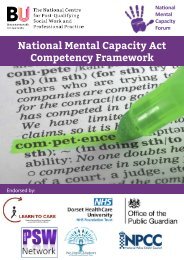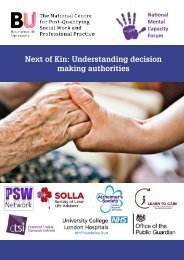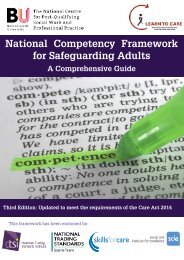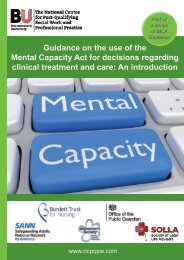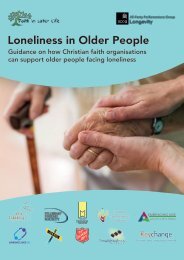MCA requirements for clinical decisions
- No tags were found...
You also want an ePaper? Increase the reach of your titles
YUMPU automatically turns print PDFs into web optimized ePapers that Google loves.
The Mental Capacity Act <strong>requirements</strong><br />
<strong>for</strong> <strong>clinical</strong> <strong>decisions</strong> regarding<br />
treatment and care<br />
Part of<br />
a series<br />
of <strong>MCA</strong><br />
Guidance<br />
www.ncpqsw.com
Foreword<br />
The National Centre <strong>for</strong> Post-Qualifying Social Work and Professional Practice has<br />
produced a series of brief guides to help all health and social care professionals navigate<br />
through and apply the principles of the Mental Capacity Act <strong>for</strong> <strong>decisions</strong> regarding<br />
treatment and care. This is one of those guides and should be read in conjunction with the<br />
other guides in the series. These guides can be downloaded <strong>for</strong> free from www.ncpqsw.com<br />
We trust that these resources will assist all health and social care professionals in delivering<br />
the very best possible care in this difficult time of the Covid 19 response and also into the<br />
future when we get to the other side of the Covid 19 pandemic.<br />
Prof Keith Brown (April 2020)<br />
Director<br />
National Centre <strong>for</strong> Post-Qualifying Social Work and Professional Practice (NCPQSW)<br />
Centre <strong>for</strong> Leadership, Impact and Management Bournemouth (CLiMB)<br />
4th Floor Royal London House, Christchurch Road, Bournemouth, BH1 3LT<br />
The new Demystifying Capacity Sage book available to order at<br />
https://uk.sagepub.com/en-gb/eur/demystifying-mental-capacity/<br />
book269861<br />
Set against the backdrop of the Mental Capacity Act<br />
2005, this book explores and addresses issues raised<br />
by mental capacity within adult safeguarding, and<br />
provides clear guidance on the use and value of the<br />
<strong>MCA</strong>, and how to ensure that the rights and choices<br />
of individuals are heard, listened to and acted upon.<br />
With contributions from a range of subject experts<br />
across the legal, social work, nursing and healthcare<br />
disciplines, this book will be invaluable to practitioners<br />
in the health and social care profession, and indeed<br />
any role where issues of mental capacity may be a<br />
concern. Case studies, reflection points and exercise<br />
are used to develop understanding and support<br />
critical engagement with practice.
Consent to treatment and care<br />
Individuals have the right to freedom of choice <strong>for</strong> the treatment and care they receive. “An adult<br />
person of sound mind is entitled to decide which, if any, of the available <strong>for</strong>ms of treatment to<br />
undergo, and her consent must be obtained be<strong>for</strong>e treatment interfering with her bodily integrity is<br />
undertaken” (Montgomery v Lanarkshire [2015] paragraph 87).<br />
Healthcare practitioners must follow due processes to support individuals in this right, in terms<br />
of ensuring in<strong>for</strong>med consent <strong>for</strong> any treatment and care (Department of Health 2009; Care<br />
Quality Commission 2011). All registered health professionals are bound by their regulatory and<br />
registering bodies published standards to ensure appropriate consent is gained, be<strong>for</strong>e any<br />
treatment or care is undertaken. Supporting individuals in giving in<strong>for</strong>med consent <strong>for</strong> <strong>clinical</strong><br />
<strong>decisions</strong>, becomes a basic principle <strong>for</strong> all practitioners involved in the planning and delivery of<br />
<strong>clinical</strong> treatments and care (Bonsall 2015; Regan & Sheehy 2016; RCN 2017; Griffiths 2017).<br />
Reasons why gaining in<strong>for</strong>med consent may be difficult:<br />
• The medical condition may affect an individual’s ability to understand, retain<br />
in<strong>for</strong>mation and weigh up the risks and benefits of a proposed treatment.<br />
• The proposed treatment may be highly complex, with many potential risks – making<br />
it difficult to understand the decision and weigh-up the in<strong>for</strong>mation to give in<strong>for</strong>med<br />
consent.<br />
• The setting in which <strong>decisions</strong> are made may be unfamiliar and frightening, causing<br />
anxiety which may impact on the individual’s decision making.<br />
• The pressures on staff, within the care setting, may lead to individuals feeling rushed<br />
or intimidated into making a decision.<br />
• The balance of power, knowledge and position between the individual and the<br />
professional may affect the autonomy of the individual (Bonsall 2015; Sidin 2016).<br />
Healthcare professionals involved in gaining valid consent to treatment and care should be aware<br />
that patients may be vulnerable to pressures from relatives, carers and practitioners to accept a<br />
treatment which they fundamentally do not want to receive (RCN 2017). Supporting individuals<br />
through consent to treatment processes must allow patients to refuse treatments on any basis,<br />
to ensure that any consent to treatment is valid. There should always be the option to say ‘no’<br />
(Grimshaw 2020).<br />
Elements <strong>for</strong> gaining valid consent – the challenges:<br />
• The individual must be given relevant and understandable in<strong>for</strong>mation regarding<br />
the proposed treatment. Clinical staff must avoid the temptation to use technical or<br />
professional language which the individual cannot be expected to understand. How<br />
this in<strong>for</strong>mation is given will be dependent on the needs of the individual receiving it.<br />
• The individual must understand the treatment and care being proposed. This will<br />
include the nature of the treatment, the purpose of the treatment and the likely effects<br />
of that treatment. This should encompass the benefits and risks of either having or<br />
refusing the treatment. The person’s understanding can be in very general terms.<br />
• The individual must have the mental competence and capacity to consent to the<br />
treatment.<br />
• The individual must be able to make a voluntary decision to give consent (Based on<br />
RCN Guidance 2017 and Montgomery v Lanarkshire [2015]).
Factors affecting mental capacity to consent to treatment and care<br />
There are a range of health conditions<br />
which may affect an individual’s mental<br />
capacity to consent to care or treatment:<br />
neurological diseases, mental health issues,<br />
learning disabilities, brain injury (traumatic<br />
or surgical), delirium, chronic brain failure<br />
such as dementia, effects of medication or<br />
anaesthesia. However, the presence of a<br />
disease or condition of the brain does not, in<br />
itself, indicate a lack of capacity (NICE 2018)<br />
– it is only when the resulting impairment of<br />
brain function caused by a condition affects<br />
the person’s ability to make <strong>decisions</strong>, that<br />
the level of impairment/cognitive ability needs<br />
to be assessed and any incapacity recorded<br />
(Brown et al. 2015). A diagnosis may define<br />
why someone may lack capacity, but the<br />
outcome of this in terms of the individual’s<br />
ability to make their own <strong>decisions</strong> must be<br />
assessed and recorded (BMA 2018). It is<br />
also important to acknowledge that a <strong>for</strong>mal<br />
diagnosis may not be available and is thus<br />
not strictly necessary to the operation of the<br />
Act.<br />
The Mental Capacity Act (2005) is clear that there should always be an assumption that<br />
individuals do have capacity to provide valid consent – unless otherwise identified and<br />
proven. Clinical decision makers should consider a range of factors, when assessing a person’s<br />
mental capacity to give in<strong>for</strong>med consent; they must ensure that reasonable measures are taken<br />
to support the person to make their own <strong>decisions</strong> regarding proposed treatment and care.<br />
Adams et al. (2018) suggest that person-centred, supported decision making should enable<br />
individuals to make their own <strong>decisions</strong> about planned treatment and care. Nurses and other<br />
health professionals should support, advocate and empower individuals to take an active part in<br />
the <strong>decisions</strong> regarding their treatment and care. This may include allowing appropriate time <strong>for</strong><br />
the decision-making process, offering support and encouragement to individuals, providing specific<br />
care and treatment to enable the individual to make the decision (Grimshaw 2020).<br />
What support should individuals be given to make their own <strong>decisions</strong>?<br />
Ensure that the person has had medication to reduce pain, anxiety, nausea,<br />
agitation if appropriate.<br />
Choose a “good time” <strong>for</strong> the individual – without rushing or distressing them;<br />
allowing more time or further occasions to make the decision.<br />
Arrange <strong>for</strong> family or carer support to make the individual feel com<strong>for</strong>table and<br />
confident to make the decision.<br />
Advocate <strong>for</strong> the individual and helping them with communication barriers – to both<br />
understand the decision and also to communicate their decision (Based on NICE<br />
guidance 2018).
Who assesses capacity to consent to treatment and care?<br />
The Code of Practice <strong>for</strong> the Mental Capacity Act (Department <strong>for</strong> Constitutional Affairs 2007)<br />
is clear that the assessment of mental capacity to consent should be undertaken by the most<br />
relevant professional, with the appropriate experience and knowledge of the treatment and care,<br />
with the necessary understanding of the legal <strong>requirements</strong> in the Mental Capacity Act (2005).<br />
Assessment of capacity is not only undertaken by senior medical practitioners, psychiatrists or<br />
mental health teams; rather the most appropriate professional <strong>for</strong> the treatment proposed.<br />
It is common <strong>for</strong> different health and social care professionals to be involved in the assessment<br />
of individuals’ mental capacity – where different <strong>clinical</strong> <strong>decisions</strong> are being made in different care<br />
settings. It is there<strong>for</strong>e important that multi-professional and multi-agency teams work closely<br />
together, to ensure clear communications and collaborative working between professions and<br />
agencies, with regards to the assessment of mental capacity of individuals, <strong>for</strong> different <strong>decisions</strong>.<br />
The mental capacity to give consent to a routine scan or treatment will be very different to that <strong>for</strong><br />
a complex, high risk procedure with long-term risks and complex options. Practitioners need to<br />
be able to make professional judgements as to who is the most relevant person to discuss care<br />
and treatment options with the individual, who should be involved in supporting the individual with<br />
the <strong>decisions</strong> needed and who is best placed to assess their capacity to give consent (Grimshaw<br />
2020).<br />
Who should undertake assessment of capacity?<br />
• General healthcare or treatment - capacity to consent should be assessed by the<br />
most relevant health professional involved in such care.<br />
• Serious medical treatments – capacity assessment should be undertaken by a senior<br />
medical practitioner BMA (2018).
Assessment of Mental Capacity<br />
Assessing the capacity of an individual to make their own <strong>decisions</strong> regarding treatment and care<br />
is not always simple – it is also often not a single event, rather a process of understanding the<br />
individual, their condition and their mental ability/capacity.<br />
Factors to remember when assessing mental capacity:<br />
• Capacity is decision-specific: assessment of capacity is not a one-off exercise,<br />
rather capacity needs to be assessed and recorded <strong>for</strong> each decision and situation.<br />
• Capacity is person-specific: individualised support is needed to each individual, to<br />
ensure that they are given all practicable help to make <strong>decisions</strong> themselves.<br />
• Capacity is time-specific: with the exception of urgent or emergency treatment, it<br />
is important to support the individual to make a decision at the time most optimal <strong>for</strong><br />
them. Decisions may need to be delayed or timed when the person is best able to<br />
make the decision themselves.<br />
• Individuals should be given appropriate in<strong>for</strong>mation: to help them make<br />
<strong>decisions</strong> themselves. The type of in<strong>for</strong>mation will depend on the decision needed<br />
and the needs of the person.<br />
• Individuals should be given all practicable help and support to make the<br />
decision: Including help to understand the decision, what is involved and why the<br />
proposed care or treatment is needed. They need to be supported to communicate<br />
their wishes and choices and to make the specific decision themselves, wherever<br />
possible (<strong>MCA</strong> Code of Practice 2007).<br />
Capacity may vary according to the <strong>decisions</strong> needed and the complexity of the in<strong>for</strong>mation<br />
involved with each decision. There<strong>for</strong>e, an individual may have the capacity to consent to the<br />
therapy treatment or the nursing care needed – but lack capacity to consent to the complex<br />
surgery or medical treatment required, with a range of risks and potential complications and sideeffects.<br />
Assessing Mental Capacity – checklist <strong>for</strong> practitioners:<br />
Presume that an individual has the capacity to make the decision.<br />
Understand that mental capacity is person, decision and time specific.<br />
Avoid making judgements or assumptions.<br />
Take all reasonable steps to help the individual make the decision themselves.<br />
Assess decision-making ability – does the person understand the decision? Can they<br />
retain the in<strong>for</strong>mation and weigh up the in<strong>for</strong>mation relevant to the decision? Can they<br />
communicate their decision effectively?<br />
Assess capacity - define the impairment of the brain which may impact on mental<br />
capacity and how this affects the individual’s functional ability to make the decision.<br />
Assess the capacity to make more complex <strong>decisions</strong> – is there need to involve<br />
other professionals in the assessment of capacity, e.g. experts, specialists (Based on<br />
Brown et al. 2015).<br />
Whilst the <strong>MCA</strong> provides principles and checklists, it does not define an answer <strong>for</strong> every case.<br />
Thus, there may be differences of opinions, changes to <strong>decisions</strong> and variations in assessments of<br />
capacity at different times, by different professionals, <strong>for</strong> different <strong>decisions</strong>.
Clinical <strong>decisions</strong> where the<br />
individual lacks capacity to consent<br />
to treatment or care<br />
All health professionals should understand their<br />
responsibilities and legal <strong>requirements</strong> <strong>for</strong> the<br />
treatment or care <strong>for</strong> those people unable to<br />
provide in<strong>for</strong>med consent, due to a lack of mental<br />
capacity. The Mental Capacity Act is clear that every<br />
reasonable step should be taken to support an<br />
individual to make <strong>decisions</strong> regarding treatment and<br />
care <strong>for</strong> themselves. Where it is clear that the person<br />
lacks capacity to consent to treatment or care, the<br />
<strong>clinical</strong> decision-makers need to make alternative<br />
arrangements <strong>for</strong> the care and treatment to be lawful.<br />
References<br />
Adams, D., Carr, C,. Marsden, D. & Senior, K. 2018. An update on in<strong>for</strong>med consent and the effect on the <strong>clinical</strong><br />
practice of those working with people with Learning Disabilities. Learning Disability Practice Vol 21 No.4 pp 82 – 88<br />
Bonsall, L. 2015. In<strong>for</strong>med consent: an ethical way of nursing. Lippincott Nursing Centre www.nursingcentre.com/<br />
ncblog/may-2015-(1)/in<strong>for</strong>med-consent-an-ethical-way-of-nursing<br />
British Medical Association. 2018. Consent to treatment; adults who lack capacity – medical students’ ethics tool kit.<br />
www.bma.org.uk<br />
Brown, R., Barber, P. & Martin, D. 2015. The Mental Capacity Act 2005: A Guide <strong>for</strong> Practice 3rd Edition. London.<br />
Sage/Learning Matters<br />
Care Quality Commission. 2011. The Mental Capacity Act 2005 – Guidance <strong>for</strong> Providers www.cqc.org.uk/sites/<br />
default/files/documents/rp_poc1b2b_100563_20111223_v4_00_guidance_<strong>for</strong>_providers_mca_<strong>for</strong>_external_<br />
publication.pdf<br />
Department <strong>for</strong> Constitutional Affairs. 2007. Mental Capacity Act: Code of Practice. London. TSO.<br />
Department of Health. 2009. Reference guide <strong>for</strong> consent to examination or treatment: second edition https://assets.<br />
publishing.service.gov.uk/government/uploads/system/uploads/attachment_data/file/138296/dh_103653__1_.pdf<br />
Griffiths, R. 2017. Limits to consent to care and treatment. British Journal of Nursing Vol 26; No 16, pp942-943<br />
Grimshaw, K (2020) in Lee, S., Fenge, L-A.., Brown, K. & Lyne, M. (Eds) 2020. Demystifying mental capacity: A guide<br />
<strong>for</strong> health and social care professionals. London. Sage/Learning Matters<br />
Mental Capacity Act (2005) www.legislation.gov.uk/ukpga/2005/9/contents<br />
Montgomery v Lanarkshire Health Board [2015] UKSC11<br />
National Institute of Health and Care Excellence (NICE). 2018. Decision making and mental capacity.<br />
NICE guideline (NG 108) https://www.nice.org.uk/guidance/ng108<br />
Office of the Public Guardian. 2007. Making Decisions: The Independent Mental Capacity Advocate (I<strong>MCA</strong>) service.<br />
OPG606 https://assets.publishing.service.gov.uk/government/uploads/system/uploads/attachment_data/file/365629/<br />
making-<strong>decisions</strong>-opg606-1207.pdf<br />
Regan, A. & Sheehy, C. 2016. Understanding <strong>MCA</strong> law and making Best Interest <strong>decisions</strong>. Nursing Standard Vol 31,<br />
No.14 pp54-63<br />
Royal College of Nursing. 2017 Principles of Consent – Guidance <strong>for</strong> Nursing staff https://www.rcn.org.uk/<br />
professional-development/publications/pub-006047<br />
Sidin, A. 2016. The obstacles of valid in<strong>for</strong>med consent. Journal of Medicine & Medical Science Vol 3; No5, pp84-88<br />
The National Centre <strong>for</strong> Post-Qualifying Social Work & Professional Practice. 2019. Advance Decisions to Refuse<br />
Treatment. Bournemouth University
Authored by:<br />
Karen Grimshaw, Visting Fellow - Independent Nurse Consultant<br />
Michael Lyne, <strong>MCA</strong> 2005 Programme Lead<br />
Professor Keith Brown, Director of NCPQSW and CLiMB<br />
Designed by:<br />
Caroline Jones, Institute/Centre Administrator<br />
The National Centre <strong>for</strong> Post-Qualifying Social Work and Professional Practice. Bournemouth University, 4th floor, Royal<br />
London House, Christchurch Road, Bournemouth, BH1 3LT<br />
Copyright © The National Centre <strong>for</strong> Post-Qualifying Social Work and Professional Practice, Bournemouth University,<br />
April 2020.<br />
All rights reserved. No part of this publication may be reproduced or utilised in any <strong>for</strong>m or by any means, electronic<br />
or mechanical, including photocopying, recording or any in<strong>for</strong>mation or storage or retrieval without prior permission in<br />
writing from the publisher.



